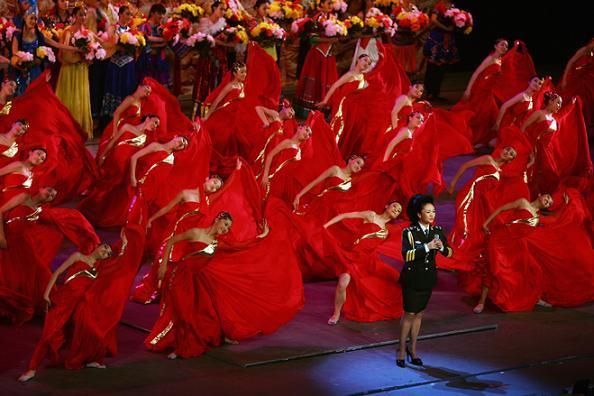

 字體:小 中 大
字體:小 中 大 |
|
|
|
| 2013/06/18 02:11:53瀏覽10527|回應13|推薦115 | |
本文標題襲自英國《每日郵報》新聞標題,其英文標題為「The picture that embarrassed China: Photo of new first lady singing to troops after Tiananmen Square massacre that was DELETED from the Chinese internet」(「讓中國難堪的照片:新第一夫人在天安門廣場大屠殺後唱歌慰勞解放軍的照片從中國網際網路刪除」),記者Alex Gore,新聞刊載時間2013/03/28。 本文迻譯美聯社記者黃敬齡特稿,該則特稿為多家國際媒體引述(例如英國《每日郵報》);本文照片並非出於美聯社特稿,而是摘自多家國際媒體。 這張被《每日郵報》評為「洩露彭麗媛較黑暗(darker side)、軍國主義(Militaristic)面目」的照片,已被中國大陸的網路審查員如數刪除,美國某知名網站評說「中國新第一夫人可能不願意世界看到它」(2013-03-30),並引述說: Censors blocked searches for “Peng Liyuan” and “First lady” on microblogging site Sina Weibo, along with traditionally more sensitive searches such as “Huangpu River and dead pigs,” China Digital Times reported.(《中國數據時代》報導說,審查員在新浪微博網站阻斷「彭麗媛」和「第一夫人」字串的搜索,其他還有慣例上比較敏感的搜索,例如「黃浦江和死豬」。) 譯文 彭麗媛的天安門照片顯示中國第一夫人在1989鎮壓後獻唱給人民解放軍 2013年3月28日星期四,北京的一個電腦螢幕顯示某網站張貼出中國新第一夫人彭麗媛的年輕時候照片,照片沒註明時間,但那是彭麗媛在1989年人民解放軍血腥鎮壓民主抗議的民眾後,獻唱給北京的解放軍戒嚴部隊。
這張照片在能夠引發網路討論之前,中國的網際網路就已經將它清除淨光了。但是這個形象──已被外界觀察家看到及分享──所勾起的回憶,卻是中國領導階層寧可也去鎮壓的,而它更反映出中國把彭麗媛推上國際舞台,企圖讓她表現中國較柔和的一面,也必會面臨的一項挑戰。 近年來,中國並沒有第一夫人角色的前例可循,中國在國內,更面臨到一個微妙棘手的平衡:中南海希望彭麗媛能夠表現出新頭號領導人習近平的比較通人情的面向,但同時卻不致暴露出權貴精英的過多特權。這個平衡,一方面,要求頭號領導人夫婦能夠博得民眾支持,另方面,又強烈戒懼對個人的狂熱崇拜,因為個人偶像崇拜可能會偏離了中國共產黨最高領導階層的協議制統治路線。
彭麗媛在那張照片的形象,穿著綠色軍服,風吹亂的頭髮往後綁成一條馬尾,持槍戴盔的解放軍排排端坐於北京天安門廣場聆聽她高歌,與她本週陪同習近平巡訪俄國和非洲,穿著時髦套裝,頭髮經過精心打點,向她熱情的東道主揮手──構成了對比。
「我想,只因為習近平趴趴走,不愛打領帶,他妻子是歌手,陪同他一同訪遊,我們這裡就有不少人希望我們也許和一位新型的領導人在打交道,但是我認為這些照片提醒世人它仍然是同一個黨」,提倡民主的維吉尼亞州阿靈頓「專案2049學會」中國人權專家凱莉居禮說,「它現在正在使用一些新的工具和新的技術,但是其目的仍然一樣:維續它自己的權力」。 50歲的彭麗媛官拜人民解放軍少將,以高亢嗓音為人民解放軍和中國共產黨唱愛國歌曲而成名,近年來都維持低調,因為她丈夫在準備接手中共黨主席一職。她的重新露面,伴隨著中國國內國營媒體的傾力頌讚,歡呼她的美麗與魅力,全為了利用這位歌手的名氣來樹立習近年在國內和國外的支持度。 「彭麗媛:讓全世界來欣賞什麼是中國的美」,一篇《中新社》評論標題如此宣稱,頌揚第一夫人的高雅風度、談吐、穿著照亮了中國文化。該篇評論還說,外交之旅有她同行,必能在中國民眾眼中陽光化了第一家庭。 但是,中國政府卻一腳跨進中國所不熟悉的、可能變幻莫測的領域。 1963年,中共主席劉少奇的夫人王光美外表光鮮亮麗,穿一襲緊身旗袍出席印尼國宴。四年後,劉少奇政壇失勢,紅衛兵逼迫王光美穿上同件旗袍遊街,把她打成腐敗資本主義者可恥的反面教材。 共產革命領袖毛澤東的妻子江青陪丈夫打天下,在激進革命運動中扮演重要關鍵角色,而在過程中,政敵都遭到無情的整肅;毛澤東死後,她受審入獄,後來保外就醫,在醫院自縊死亡。 在中國網際網路這個過分講究政治正確性的世界,彭麗媛的天安門形象到目前為止極為短命,她持續仍舊是一個家家戶戶所喜歡的公眾人物,在國內人氣極高。該張照片主要在「推特」流傳,「推特」在中國受到封鎖。中國境內流行「微博」,「微博」張貼了幾次,馬上就被網路審查員刪除。 許多中國年輕人不知道,在1989年的六月三日和四日,人民解放軍使用武力,摧毀長達數週的北京民主運動,屠殺好幾百、可能好幾千的人民。有些中國人確實知道那一年的攻擊,卻選擇諒解彭麗媛,畢竟她隸屬於藝工隊責無旁貸,人民解放軍又權大勢大。那時候,她丈夫習近平在一座東部城市擔任地委書記。 「那張照片的國際負面影響在可能要大於國內負面影響」,香港城市大學的政治學家鄭宇碩說。他還說,彭麗媛可能還會受到更多的檢視,而這種形象會讓人質疑習近平的改革誠意。 「習近平拿到大當家的地位已經過了好幾個月了,明明確確地,我們看不到任何朕兆顯示他在這個階段有興趣去推動重大的政治改革。」 根據一名中國記者宋立(音譯),那張彭麗媛慰勞戒嚴部隊的照片是《人民解放軍畫刊》(供民眾閱覽的軍方雜誌)1989年期刊背後封面的快照,他說他在數年前用手機拍下它,不慎發佈在他的「微博」。宋立說,他立刻刪除它,他完全不明白為什麼幾年後會在網路又冒出來。 即便原件已被刪除,「微博」的使用者輕易能夠存檔,然後再度傳佈它。位在美國的《中國數據時代》專事追蹤中國線上傳媒狀況,高調刊登這張照片,於是它又散佈至更遠的所在。 澳洲摩那許大學華裔軍事歷史家Warren Sun說,他並不懷疑這張照片的真實性,並引述一份1992年學術報告,裡頭提到彭麗媛在六四鎮壓後以歌名叫「最親愛的人民」的愛國歌曲向北京戒嚴部隊致敬。 雖然彭麗媛的軍旅生涯大多都一直在唱歌,但是她的許多公眾形象都流露出來軍國主義色彩,這一點卻是她與蜜雪兒歐巴馬、前法國第一夫人卡拉布魯妮、多數其他國家第一夫人大相逕庭的。對彭麗媛來說,天安門照片並非偶一為之:她18歲即從軍,曾出現於電視MV封面,搭配跳戰舞、身穿戰鬥迷彩服的排排軍士和重武器。
她也主演過一齣2007年歌舞劇,身穿藏服的辣妹在她身後婆娑起舞,她則高歌頌揚解放軍在 1959 年入侵西藏,歌詞有句說「誰將會解放我們?就是親愛的人民解放軍!」該齣電視音樂劇引起西藏人權團體的嚴厲譴責。
彭麗媛雖然有這些過去,她在中國的吸引力從下面這事可以看得出來:一位男士,他的19歲兒子在天安門鎮壓時被殺死,卻說他並不懷恨她。 「如果我那時候知道這回事,我會非常憎厭她。但是現在,客觀去看它,一切都過去了」,王方第(音譯)說,他的兒子王南(音譯)頭部中彈死亡,「她屬於解放軍,解放軍要她表演,她必須表演,她有什麼選擇?」 王方第在中國音樂學校教書,彭麗媛20多歲時被軍方送到那裡學聲樂。雖然他從來沒有直接教過她,王方第已經知道她是誰,他形容她很謙虛,是天賦高的民謠歌手、傑出的學生。 「當我回顧歷史,我會從其他的角度去檢視」,王方第說,「即使她做過一些錯事,我們不應該大驚小怪,重要的是未來會發生什麼」。 原文 Peng Liyuan Tiananmen Photo Shows China's First Lady Singing For Troops After 1989 Crackdown A computer screen shows websites displaying an undated photo of China?s new first lady Peng Liyuan in younger days singing to martial law troops following the 1989 bloody military crackdown on pro-democracy protesters, in Beijing, China, Thursday, March 28, 2013. (AP Photo/Ng Han Guan) 413221238Get World Alerts: BEIJING — A photo of China's new first lady Peng Liyuan in younger days, singing to martial-law troops following the 1989 bloody military crackdown on pro-democracy protesters, flickered across Chinese cyberspace this week. It was swiftly scrubbed from China's Internet before it could generate discussion online. But the image – seen and shared by outside observers – revived a memory the leadership prefers to suppress and shows one of the challenges in presenting Peng on the world stage as the softer side of China. The country has no recent precedent for the role of first lady, and also faces a tricky balance at home. The leadership wants Peng to show the human side of the new No. 1 leader, Xi Jinping, while not exposing too many perks of the elite. And it must balance popular support for the first couple with an acute wariness of personality cults that could skew the consensus rule among the Chinese Communist Party's top leaders. The image of Peng in a green military uniform, her windswept hair tied back in a ponytail as she sings to helmeted and rifle-bearing troops seated in rows on Beijing's Tiananmen Square, contrasts with her appearances this week in trendy suits and coiffed hair while touring Russia and Africa with Xi, waving to her enthusiastic hosts. "I think that we have a lot of people hoping that because Xi Jinping walks around without a tie on and his wife is a singer who travels with him on trips that maybe we're dealing with a new kind of leader, but I think these images remind people that this is the same party," said Kelley Currie, a China human rights expert for the pro-democracy Project 2049 Institute in Arlington, Virginia. "It's using some new tools and new techniques, for the same purposes: to preserve its own power." Peng, 50, a major general in the People's Liberation Army who is best known for soaring renditions of patriotic odes to the military and the party, kept a low profile in recent years as her husband prepared to take over as Communist Party chief. Her re-emergence has been accompanied by a blitz in domestic, state-run media hailing her beauty and charm, in a bid to harness the singer's popularity to build support for Xi at home and abroad. "Peng Liyuan: Let the world appreciate the beauty of China," declared the headline of a China News Service commentary that said the first lady's elegant manners, conversation and clothing would highlight Chinese culture. Her presence on diplomatic trips would demystify the first family for the Chinese public, the commentary said. However, the government is stepping into little-charted and possibly treacherous waters for China. In 1963, the glamorous Wang Guangmei, wife of President Liu Shaoqi, wore a tightfitting qipao dress to a state banquet in Indonesia. When the political tides turned against Liu four years later, radical Red Guards forced Wang to don the same dress and paraded her through the streets as a shameful example of capitalist corruption. Revolutionary leader Mao Zedong's wife, Jiang Qing, played a key role in the same radical campaign in which political opponents were mercilessly persecuted; after his death, she was put on trial and imprisoned, then moved to a hospital where she hanged herself. The lifespan of Peng's Tiananmen image in the finicky world of the Chinese Internet has so far been short, and she remains a beloved household name with huge domestic popularity. The photo has circulated mainly on Twitter, which is blocked in China. The few posts on popular domestic microblogs did not evade censors for long. Many young Chinese are unaware that on June 3 and 4, 1989, military troops crushed weekslong pro-democracy demonstrations in Beijing with force, killing hundreds, possibly thousands, of people. Those who do know about the assault tend to be understanding of Peng's obligations as a member of a performance troupe in the all-powerful People's Liberation Army. At the time, her husband Xi was party chief of an eastern city. "The photo probably has a negative impact more so internationally than domestically," said Joseph Cheng, a political scientist at City University of Hong Kong. He said more scrutiny of Peng is likely and such images could raise questions about Xi's interest in reforms. "It has been several months now that Xi Jinping has assumed the top leadership role and certainly, we have found no indicator that he is interested in this stage to push serious political reform." The image is a snapshot of the back cover of a 1989 issue of a publicly available military magazine, the PLA Pictorial, according to Sun Li, a Chinese reporter who said he had taken a photo of it on his cell phone several years ago when it was inadvertently posted on his microblog. Sun said he quickly deleted it and had no idea how it resurfaced on the Internet years later. Microblog users can easily save images and recirculate them even after the original posts have been deleted. The picture spread further after it was tweeted by the U.S.-based China Digital Times, which tracks Chinese online media. Warren Sun, a Chinese military historian at Monash University in Australia, said he had little doubt about the authenticity of the image, citing a 1992 academic report as saying that after the crackdown, Peng performed a song titled "The Most Beloved People" in a salute to martial law troops. While most of her army career has been in singing, the militaristic overtones of many of Peng's public appearances set her apart from Michelle Obama, former French first lady Carla Bruni and most of their counterparts in other countries. But for Peng, the Tiananmen photo was no one-off: She has been in the military since age 18 and has fronted TV music videos featuring dancing lines of men with combat fatigues and heavy weaponry.
In an indication of Peng's appeal in China despite her past, a man whose 19-year-old son was killed in the Tiananmen crackdown said he bears no grudges against her.
Wang was a teacher at the China Conservatory of Music when Peng had been sent there by the military to study singing in her 20s. Though he never taught her directly, Wang had known who she was and describes her as being modest, a talented folk singer and an outstanding student. "When I look back at history, I will look at it from other perspectives," Wang said. "Even if she had done something wrong, we shouldn't make a fuss about it. What's important is what happens in the future." |
|
| ( 時事評論|人物 ) |





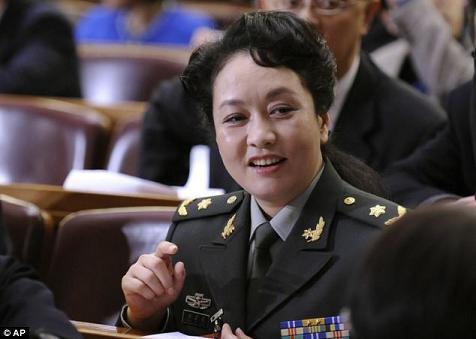
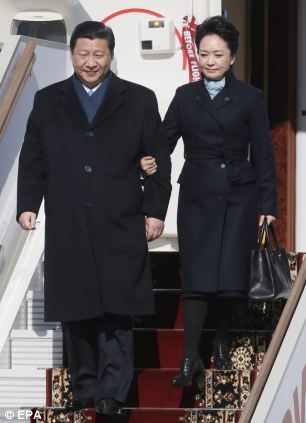
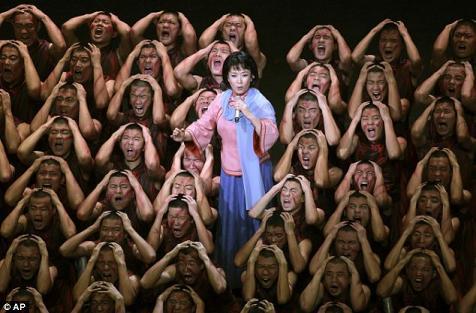 (像女祭師與信眾)
(像女祭師與信眾)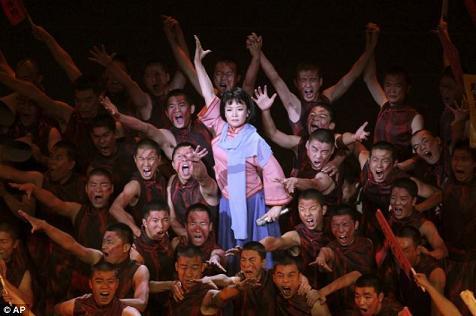 (聯想到 "暮光之城")
(聯想到 "暮光之城")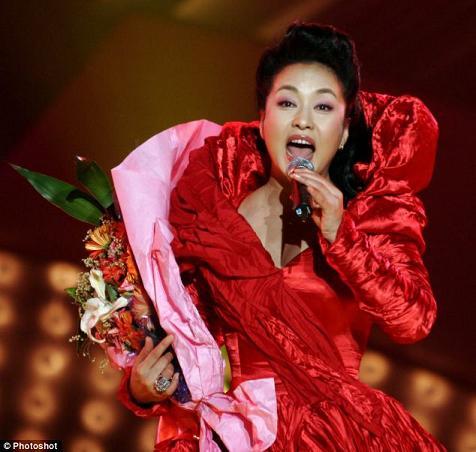 (聯想到 Ann Rice 小說, Q字開頭的)
(聯想到 Ann Rice 小說, Q字開頭的)